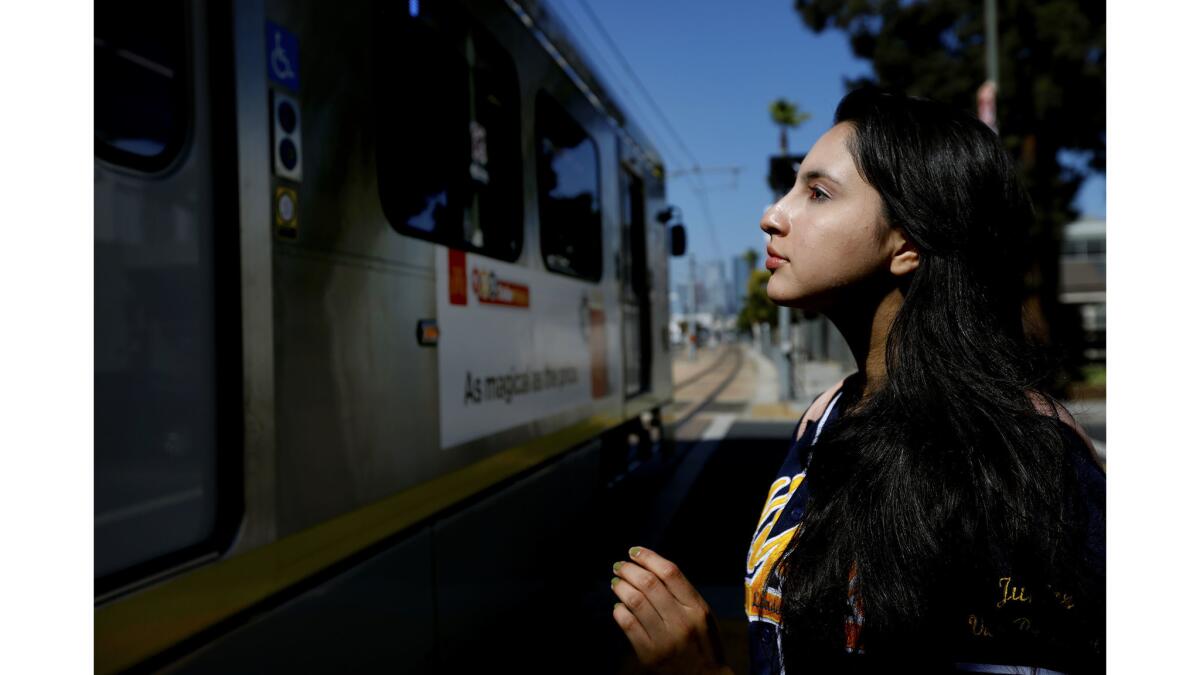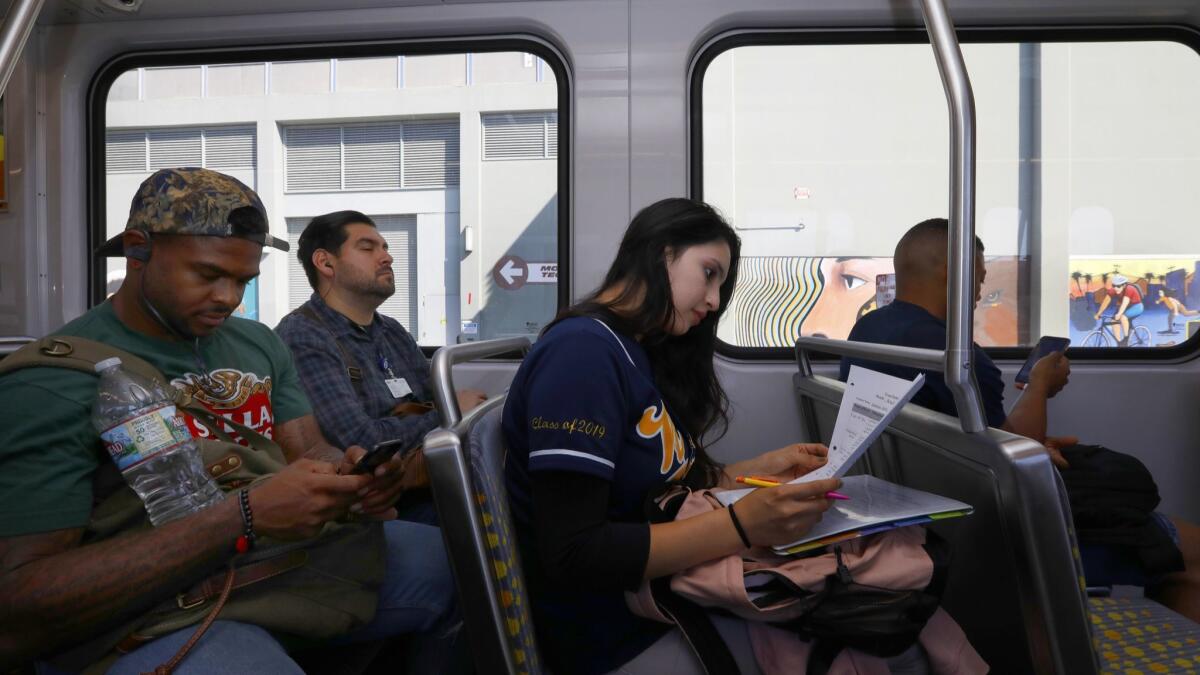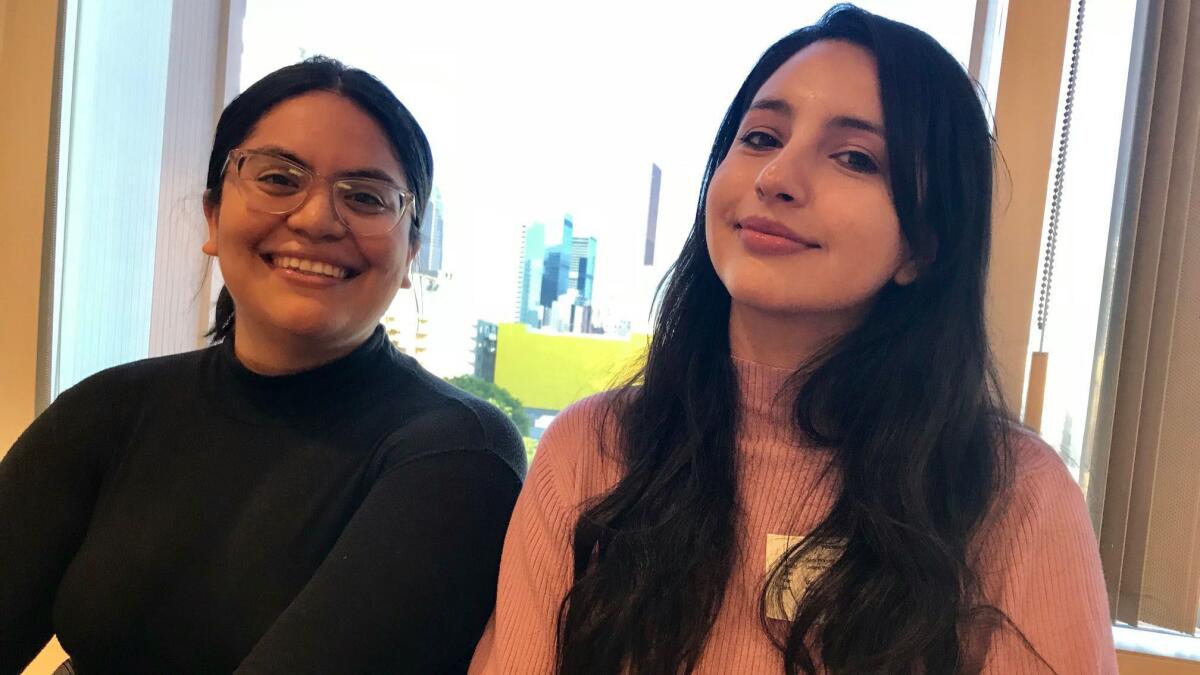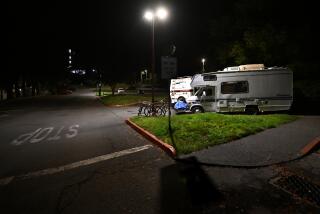Column: How two young women bond while plotting to escape poverty in L.A.

Yecenia Perez, 17, says she doesn’t feel safe commuting to school and home, a one-hour trek each way by bus and two trains.
“I’ve had men push me up against the fence outside school,” she said, and she also described an attempted assault by a neighbor.
When Perez gets home to her family’s one-bedroom apartment in the evening, north of Koreatown, she has no privacy. Tight quarters bring tension and bouts of depression.
“We’re six,” she said, telling me she shares the only bedroom with a younger sister and an older sister too when she’s home from college. Her brother sleeps in the living room with Mom and Dad.
This is not a new situation for Perez. This is her life. And in Los Angeles, she’s one more invisible face in the crowd.
We keep hearing about an economy that’s referred to as robust or rip-roaring, which leaves a lot of people wondering how they missed out on the recovery. Earlier this year I began taking a closer look at how a state that’s leading the boom has 20% of its children living in poverty. In L.A. Unified, the number is 80%, and at one elementary school I’ve been taking a look at in the San Fernando Valley, 20% of the students are homeless.
But statistics are dry and overwhelming, and you can’t begin to feel the significance of it all without knowing something about the people behind the numbers.

Yecenia is a senior at Orthopaedic Hospital Medical Magnet High School south of downtown, and she wants desperately to go to college, but she’s had a lifetime of hurdles in her way.
Yecenia and her older sister, Melanie, told me their strictly religious parents — who work low-wage jobs in the clothing industry — did not encourage them to go to college. That may be one reason the girls were so determined to do just that, to get good jobs, to defy traditional gender role and cultural expectations, and to escape the circumstances they were born into.
“My parents always emphasized our spiritual well-being but never looked out for our emotional, educational or even our physical well-being,” Yecenia said. “I like to write my thoughts down. I compare myself to a bird and I feel caged, but going to college seems freeing. Going to college allows me to have real opportunities and create a life for myself, so I don’t have to be dependent on a man.”
Melanie, now a sophomore at UCLA, was a great mentor for Yecenia. But when Melanie left for school, Yecenia needed someone else with whom to share her dreams and her despair. A high school friend recommended she look into the young civic leaders program at United Way of Greater Los Angeles. Yecenia attended a meeting two years ago and immediately signed on to attend rallies, host candidate forums, march for homeless services, run voter registration drives and speak up about how to make schools better.
”I feel like the needs of students, and the voice of students, should be more elevated,” Yecenia said. “Decisions are made based on what adults think we need, but from my experience, I needed to see therapists and school psychologists and I never got that until this year, my senior year.”
LAUSD Supt. Austin Beutner told me he heard Yecenia express those very sentiments at a forum, and he thinks she and other students hit upon a key to better outcomes.
“They were articulate and candid,” he said, “and I could not have heard a more compelling case for mentors and counselors in our schools to help pick them up when they fall.”
When Yecenia joined the United Way program in 2016, she found such a person in Katherine “Kat” Trejo, a young college graduate and L.A. Unified alumna who had just become program coordinator.
“We’ve built a relationship, and I take relationships very seriously,” said Trejo, 24, who believes her own history makes it easier for her to relate to the students and vice versa. “They see themselves in me and they’re very open about their struggles at home and their worries about college. They know I’ll understand.”
Trejo grew up in a studio apartment near Echo Park with her mother, a house cleaner, and a brother with disabilities. Two sets of relatives live in the same building, four of them stuffed into one tiny apartment and five in another.

Trejo recalls her anger at being awakened late at night because her brother was hungry and turned on the lights in the room they all shared.
Yecenia recalls her embarrassment at school when teachers commented on clothes so old they were too small for her.
Trejo recalls wanting to get into a college far from home, and she willed herself to get from LAUSD to UC Santa Cruz.
Yecenia’s top two dream colleges are UC Berkeley and Stanford, and she takes evening classes at Los Angeles Trade-Technical College or studies at Heart of Los Angeles in the evening, so she can concentrate in a quiet, stress-free place.
Trejo said that in Santa Cruz, she had barely unpacked when the culture shock set in.
“When you go to high school in L.A., everyone’s poor so it doesn’t seem weird,” she said. “But then you go to college and meet students who lived in mansions, or they were middle class, and I realized, ‘Wow, I didn’t know how poor I was.’”
Trejo said she had no intention of returning to Los Angeles after school, but her mother was in debt, partly because she had helped pay college bills not covered by the scholarship. So Trejo came back. She wanted to live in an apartment in Echo Park, her favorite L.A. neighborhood. But on her entry-level salary, gentrification had priced her out. So she moved into the same studio she’d grown up in, with her mother and brother.
“I’ve come to terms with it in the last couple of years, but I still have feelings of jealousy and anger,” Trejo said, telling me that with a college degree and a job, she did not expect to still be poor. “A single in Echo Park is $1,800. A house is $1 million. I see people I knew growing up who are living in cars.”
We looked out the window of her downtown office at all the towering new apartment buildings and other signs of prosperity.
“If you’re poor,” Trejo said, “none of that applies to you. You just keep being poor.”
Trejo is both appreciative of her mother’s sacrifice — “her body has deteriorated from work” — and disappointed that for the three of them, better days seem distant. But rather than let the situation crush her spirit, she’s holding on to her conviction that education is still the answer. She wants to go back to school, move up to a better-paying job and live on her own. In the meantime, the young woman who was once provided for is now the provider, both at home and at work. And Yecenia is ever grateful.
“Whenever I accomplish something, like boosting my GPA or moving up to the next round of a scholarship interview, she’s one of the first people I tell,” Yecenia said.
In the last week, Yecenia left home briefly because of a family dispute, stayed with a friend and slept outside one night. She told me she’s exploring the possibility of moving into a foster home.
“Kat’s made it possible for me to open up to her. I feel like I can call her anytime, tell her I need to talk and just vent,” Yecenia said. “She’s always been the support I need. She always found me support for mental health or educational needs.
“Although she’s my program director, she’s more than that,” she said. “I see her as my friend, and sometimes she’s my sister.”
Get more of Steve Lopez’s work and follow him on Twitter @LATstevelopez
More to Read
Start your day right
Sign up for Essential California for news, features and recommendations from the L.A. Times and beyond in your inbox six days a week.
You may occasionally receive promotional content from the Los Angeles Times.







